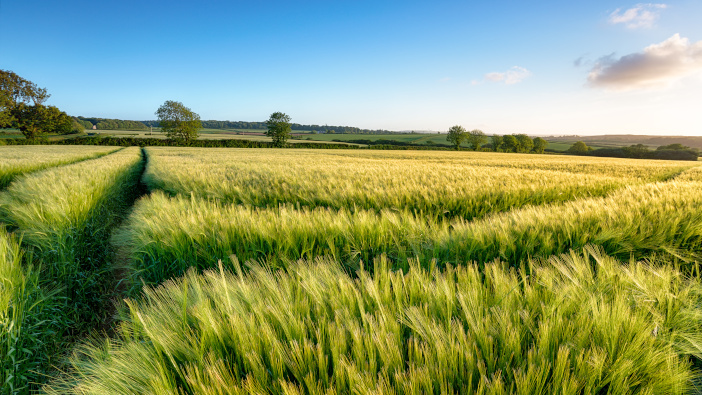Chancellor Rachel Reeve’s autumn budget saw the agricultural budget remain fixed at £2.4bn, despite fears that it would be cut as part of the effort to fill a financial blackhole reportedly left by the Conservatives.
There was also a commitment to continue with the Environmental Land Management Schemes (ELMS) and Sustainable Farming Incentive (SFI), although with an acceleration in cuts to delinked payments to help fund this. A move which will impact the largest claimants in the coming years.
For 2025, a 76% reduction will be applied to the first £30,000 of payment, with no further payment beyond this threshold. This would mean that businesses that had claimed more than £100,000 in subsidies during 2020 would receive less than £8,000.
Other feared changes were brought into effect, however. Inheritance tax saw the most damaging changes, with agricultural property relief (APR) and business property relief (BPR) both changing from April 2026. Instead of 100% relief for the full value, as was previously the case, this will only apply to the first £1m with 50% relief applied to properties beyond this threshold.
According to the government, it expects these changes to ‘only’ affect 2,000 estates in the first year.
Property that has been transferred to the next generation more than seven years before death will remain exempt from inheritance tax, though this is a small comfort as loss of life is rarely planned for. In fact, given agriculture’s poor health and safety record, this is the industry most likely to be caught out by a sudden death.
Elsewhere, the increases in employer National Insurance payments to 15% and the boost in the National Minimum and National Living Wage will see day-to-day costs increase for all businesses, through it could be argued that asset-rich, cash-poor farming firms will be the hardest hit overall.
‘Our commitment to farmers […] remains steadfast…’
Food Security Minister Daniel Zeichner made a statement as soon as the budget was completed: “Farming and food security are the foundations of a healthy and resilient economy and environment.
“Our commitment to farmers and the vital role they play to feed our nation remains steadfast.
“That is why this Government will commit to the largest ever budget directed at sustainable food production and nature’s recovery in our country’s history, enabling us to keep momentum on the path to a more resilient and sustainable farming sector.
“ELM schemes will remain at the centre of our offer for farmers and nature, with the Sustainable Farming Incentive, Countryside Stewardship Higher Tier and Landscape Recovery all continuing.
“We will also support farmers with the exceptional impact of flooding last winter, paying out £60 million for farmers affected by unprecedented rainfall and flooding through the Farming Recovery Fund.
“Our focus will be on making sure funding is used to the best effect for food, farming and nature, and that our schemes work for farms who have been too often ignored such as small, grassland, upland and tenanted farms.
“We look forward to working with farmers across the country to continue to improve and evolve our schemes and policies, to make them work for farmers and nature.”
The statement also noted that there would be simplifications made to the grant funding schemes, designed to funnel money to companies that needed it most to deliver benefits for food security and nature.
A commitment of £208m each year until 2026 was also announced to renovate the biosecurity facilities at Weybridge to help tackle animal disease. Defra has also stated that longer-term solutions are needed to support growers during extreme weather events following the £60m payout – increased by £10m – through the Farming Recovery Fund.
NFU responds
The NFU warned that the budget was a blow to British farmers and could result in food price rises as it would increase the cost of producing food when farming businesses were not in a position to absorb it.

President Tom Bradshaw said: “This Budget not only threatens family farms but will also make producing food more expensive. This means more cost for farmers who simply cannot absorb it, and it will have to be borne by someone. Farmers are down to the bone and gristle, who is going to carry these costs?
“It’s been a bad Budget for farm confidence, which is already at an all-time low. After today farmers, including tenants, have more uncertainty and more worry, not less.
“When you look farmers in the eye and make them a promise, keep it. The shameless breaking of those promises on Agricultural Property Relief will snatch away much of the next generation’s ability to carry on producing British food, plan for the future and shepherd the environment.
“It’s clear the government does not understand that family farms are not only small farms, and that just because a farm is a valuable asset it doesn’t mean those who work it are wealthy. Let’s not sugar-coat this, every penny the Chancellor saves from this will come directly from the next generation having to break-up their family farm.
“This is one of a number of measures in the Budget which make it harder for farmers to stay in business and significantly increase the cost of producing food.”
‘A cut in real terms’
The Country Land and Business Association (CLA) called the freezing of the Defra budget a cut in real terms.
Victoria Vyvyan, president, said: “The government was elected on a promise of growth, but has done nothing for the countryside but freeze the agriculture budget and raise taxes.
“The decision to freeze the budget at the same level since 2014 – a cut in real terms – will have consequences for hard-pressed farmers, consumers and the environment. It will damage confidence and stability across the industry, risking farm profitability. It could hit sustainable food production and undermine improvements to wildlife habitats, flood management and access to nature.
“Defra’s proposal to accelerate the end of direct payments would be incredibly damaging to investment in farming and diversified businesses.
“A recent CLA survey found that 80% of respondents said they ‘strongly agreed’ or ‘agreed’ that payments through farming schemes are critical to ensure their businesses stay viable. There is enormous growth potential in the countryside, but we need the government to be working with us, not against us.”
Speaking on the changes to APR and BPR, she added: “Labour has made repeated assurances over the last 12 months that it would not tamper with inheritance tax reliefs, and its decision to now rip the rug from under farmers is nothing short of a betrayal.
“This puts dynamite beneath the livelihoods of British farming, and flies in the face of growth and investment. We estimate that capping agricultural property relief at £1m could harm 70,000 UK farms, damaging family businesses and destabilising food security. In its attempts to raise more revenue the government will cause great damage, jeopardising the future of rural businesses up and down the country.
“Many farmers, operating on slim margins, will now face having to sell land to pay inheritance taxes. At a time of profound change in the industry, adjusting to new agricultural policies, the government is offering no vision for a positive economic future for us in the rural community. We will continue to argue the case for these vital reliefs.”
AHDB responds
While a full analysis of SFI and the wider budget would come at the AHDB GMO briefing on the 5th of November, economics and analysis director David Eudall, provided the organisation’s initial thoughts on the headline changes.
“The funding pot for agriculture in the UK has remained constant at £2.4 billion since the 2019-24 parliament. During this time, inflation has led to a 44% increase in farm costs while the agriculture budget remains the same. We are at a tipping point of how effective this budget can be in meeting the desired outcome of balancing food security, supporting farm efficiency, and delivering environmental benefits given the inflationary pressures we see.
“The impact of the changes to inheritance tax means that from April 2026, a farm worth £2 million will have a £100,000 tax requirement to pay on the £1 million above the threshold. For every additional £1 million the farm is worth, a further £100,000 will be required to be paid in inheritance tax.”
Good news for farming and nature
Sustain, a charity and pressure group that advocates for agriculture policies which are socially and environmentally responsible, was one of the few organisations to be positive about the budget – though it focused on the continuation of the environmental subsidy schemes.
Will White, sustainable farming coordinator, said: “We welcome the government’s commitment to maintaining funding for Environmental Land Management schemes.
“Prioritising the effective rollout of these schemes is the best way for the government to meet its environmental improvement targets while supporting long-term, resilient food security. While there is still much room for improvement in ELM schemes, this budget marks a promising step forward for the future of farming and nature.
“Now, it’s crucial that DEFRA focus on easing the application process and ensuring quick payments to ensure that farmers can access funding swiftly.”
‘A need to hold government to account’
James Farrell, head of rural consultancy and partner at Knight Frank, provided a comment about the budget.
He said: “The biggest tax raising budget in generations has confirmed our worst fears. Boxed in by her election pledges – to not increase income tax, VAT nor National Insurance contributions for working people – the Chancellor, with little room for manoeuvre, has announced changes that threaten the very fabric of the countryside and the communities that, for generations, have been the custodians of the land that we all rely on for our day-to-day existence. The publication of ‘Land for the Many’ in 2019 set out to “put land at the heart of political debate”. That has certainly been achieved today.
“The ‘curved ball’ that was leaked on Friday of last week is Rachel Reeves’ decision to change the fiscal rules to allow the borrowing of billions to develop the nation’s infrastructure. However, in identifying ways to ‘fill the blackhole’ we all knew that income from taxation was going to be firmly in the frame. Employers will bear the real burden through the increase in National Insurance contributions which will raise £25bn pa. The consequential impact of this change on ’working people’ will be debated for months to come but the secondary impacts could be significant.

“I, like many, was incredibly concerned about how farming and the wider rural sector would fare when Ms Reeves took to the podium earlier this afternoon. Having heard Steve Reed state at last December’s CLA Rural Business conference that farmers and landowners had nothing to fear around APR from an incoming Labour government, and then hearing him at the Great Yorkshire Show say that he was keen to listen and learn about a sector that he openly admitted to knowing little about, I remained hopeful that the leaks of the past few weeks would prove to be inaccurate. Sadly, this has not been the case, and one can only now wonder what else lies in store for a sector of the economy that every aspect of society relies upon, but also one which Mr Reed and Ms Reeves seem intent on dismantling. All this seems in stark contrast to Mr Reed’s statement in August that the government would “restore stability and confidence in the sector introducing a new deal for farmers.” If this is the new deal it doesn’t look very appealing.
“From April 2026, the first £1 million of the value of agricultural properties will be exempt from Inheritance Tax (IHT), but above that threshold, the combined relief available from APR and BPR will drop to 50% of the standard 40% rate of IHT. This means that inheritance tax of 20% will effectively apply on the full value of farms and rural estates above £1 million.
“Firstly, on the changes to APR and BPR , removing the relief from assets exceeding the first £1 million and opening landowners and farmers to the full impact of inheritance tax, shows how detached and unsupportive this Government is towards the importance of land for three core imperatives for the UK – smart food production geared to increased food security and better public health, improving the nation’s carbon position through environmentally conscious land management and increasing the nation’s biodiversity through land managers’ interventions. These are all critical to our nation’s resilience in the face of significant global challenges. Pulling the rug from farmers and removing APR and BPR is the worst-case scenario and can only result in long standing family businesses, that have been encouraged to diversify, failing. This is not just significant for owner-occupiers, it has ramifications for tenant farmers too. The £1m threshold is pretty meaningless given the level of capital employed in farms and other small businesses across the country. Farms and estates will have to sell land, or property, to pay the inheritance tax, threatening all of these critical intents and adding further challenge to many already beleaguered rural communities
“Secondly, the increase in the minimum wage from April 2025, as well as employers’ national insurance contributions will add another unwelcome pressure for rural SMEs and family businesses, especially those employing people for retail, hospitality and horticulture, particularly around harvesting.
“With the change to BPR, it is not just farmers and landowners who will be affected, it is all small and medium sized businesses across the country that will bear the brunt of this budget.
“There will be a need for a rapid and concerted effort from the leaders in the rural and farming sectors to hold the Government to account on ensuring that the gulf between urban and rural support doesn’t become even wider. Key to this will be helping the government understand the true implications of these changes prior to their introduction in April 2026, developing policy to support the natural capital market to give investors the confidence to finance nature, and to ensure delivery of a rural budget that enables UK land managers to deliver on all of the interwoven asks from their land – food, climate, biodiversity, as well as their underacknowledged social and community contributions. These deliverables have become non-negotiable, and we seem to be a long way from a government that recognises the part it needs to play.”
Impact on land markets
Tim Jones, Carter Jonas head of rural, said: “Changes announced today relating to APR and BPR will undoubtedly present a significant financial challenge for agricultural businesses who plan to pass on their farms to the next generation. It is likely that land and property will have to be sold or debt taken on to pay the new inheritance tax charges. Both scenarios will impact the viability of already struggling businesses.
“The impact on the tenanted sector is also concerning as landlords may decide to take land back in hand or sell.
“The sale and purchase of farms and estates will also be affected by the announced increase in capital gains tax. Rollover relief remains in place which is an important driver in demand for land so investment in agricultural land and property is likely to continue at current levels.
“Some further clarity has been provided on the tax treatment of land under environment management which now qualifies for agricultural property relief. This is something many of our clients were seeking before committing to environmental schemes, particularly long-term options.
“The increased cost in labour intensive farm operations will also be a concern to many in the industry as the increased cost of labour continues to push up production costs in an already tight market.”


